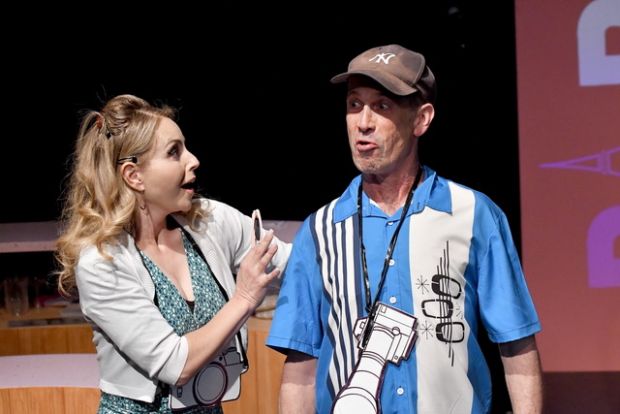You Don’t Have to be Jewish
The 1960s was a special time for comedy albums. Comedians like Wayne and Shuster, Stan Freberg, Bob Newhart, Victor Borge, The Goons, Peter Cooke and Dudley Moore, The Goodies and Monty Python made LPs that entertained families around the world. Some of us remember them well, even still quote them!
Radio broadcaster Bob Booker was one of them. His album The First Family, a satire on President JFK and the Kennedy family, sold over 7.5 million copies and won multiple Grammy Awards. A demand for more resulted in another twenty-two albums, among them You Don’t Have to be Jewish, which was launched in 1965 and sold millions of copies.

The sketches and songs on the album have been quoted for years. With the permission of Booker, now 92 years old, they have been collected and published in Australia by DSPress. They are still very funny to read. Some are very short; others are put to music. But all were written to be recorded on an album, not performed live, on stage! So the decision to do so required some courage, as director Ruth Fingret explains:
“Directing it for stage has many challenges not the least being that we have forty scenes changes … we’ve had to honour the original recording, while also aiming to provide a satisfying theatrical presentation of a script that was originally written simply to be heard”.

Forty scene changes! Imagine the changes of character and costume! This can lead to a backstage nightmare – especially when some of the sketches are only a page in length. But Fingret and her stalwart cast and crew have attacked the task with typical thespian fervour – and Jewish humour!
They move from sketches of two characters to sketches of six. They change characters constantly. They sing and move to modest choreography. They make mischievous eye contact with the audience. Most of all they make people laugh.
They laugh because the scripts are funny. They laugh because the cast understands and captures the right intonations and timing. They laugh because the characters depicted are universal so ‘you don’t have to be Jewish’ to recognise them.

The six actors work with speed and diligence to present over a hundred characters. Just remembering the order of their character changes must be difficult, let alone making so many costumes changes. But they work well together, establishing each character with a stance, a walk, a gesture or an accent. Geoff Sirmai, James Burchett and producer David Spicer (who slipped into the cast with seven days’ notice), play fathers, sons, husbands, lawyers, doctors, husbands even cowboys. Christine Greenough, Liz Hovey and Andrea Ginsberg play different mothers and daughters, brides, wives, gossips, even a gypsy.
They play these characters with energy, good timing, and obvious enjoyment.
This is especially so in some of the longer sketches. In The Ballad of Irving (the hundred and forty-second fastest gun in the west), Spicer leads with the others doing backing vocals and doing fancy footwork. The Reading of the Will is one of the best known of Booker’s scripts and those in the audience who knew it well weren’t disappointed by Sirmai’s expectant face as he waited to hear whether his brother-in-law would remember him in his will.

Greenough and Ginsberg’s timing in A Call from Greenwich Village makes the scene especially funny. Liz Hovey uses her Theatresports experiences to good effect, especially as The Gypsy Fortune Teller. James Burchett plays all the younger men and a very effective teacher of Yiddish!
Linking forty different scripts is difficult, especially as the content and contexts change as quickly in this production. Here the production team have come to the fore. Musical director and choreographer Aaron Robuck, design consultant Parish Stapleton and lighting designer Mehran Mortezaei work cleverly together to give the production needed continuity and colour. The set is utilitarian, with some quirky hand props. Live on keyboard, Robuck skilfully uses musical interludes to link or introduce scenes and Mortezaei picks up changes in ambience with subtle lighting effects. Mazel Tov!

The production pays homage to Booker and his clever, much-loved scripts – and introduces them to new audiences. The publication by DSPress also makes them available for future productions, and the possibility of linking them in different ways. Order the book now at Book Nook.
Carol Wimmer
Images: Lindsay Kearney, Lightbox Photography
Subscribe to our E-Newsletter, buy our latest print edition or find a Performing Arts book at Book Nook.
